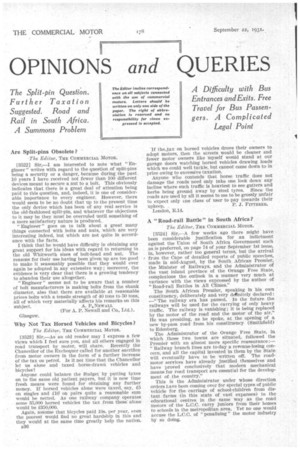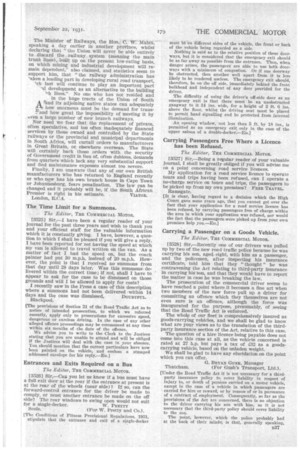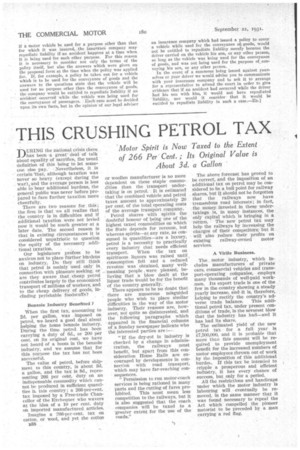OPINIONS and QUERIES Are Split-pins Obsolete ?
Page 54

Page 55

Page 56

If you've noticed an error in this article please click here to report it so we can fix it.
The Editor, THE COMMERCIAL MOTOR.
[3522] Sir,—I am interested to note what " Engineer " writes with regard to the question of split-pins being a security or a danger, because during the past 10 years I have received not fewer than 100 different devices meant to secure a nut to a bolt. This obviously indicates that there is a great deal of attention being paid to this question, and, indeed, it is one of considerable importance to every engineer. However, there would seem to be no doubt that up to the present time the only device which has been of any real service is the old-fashioned split-pin, and Whatever the objections to it may be they, must be overruled until something of a more satisfactory nature is produced.
" Engineer " goes on to talk about a great many things connected with bolts and nuts, which are very interesting indeed, but which are not quite in accordance with the facts.
I think that he would have difficulty in obtaining any great support for his ideas with• regard to returning to the old Whitworth sizes of bolt-head and nut. The reasons for their use having been 'given up are too good to make it seasonably possible that they wbuld ever again be adopted in any extensive way ; moreover, the evidence is very clear that there is a growing tendency to abandon their use altogether.
"Engineer" seems not to be aware that a number of bolt manufacturers is making bolts from the shank diameter, also that there are available at reasonable prices bolts with a tensile strength of 40 tons to 50 tons, all of which very materially affects his remarks on this subject. A. P,,,NEWALL
(For A. P. Newall and Co., Ltd.).
Glasgow.
Why Not Tax Horsed Vehicles and Bicycles ?
The Editcr, THE COMMERCIAL MOTOR.
135231 Sir,—As an old reader may I express a few views which I feel sure you, and all others engaged in road transport by motor, will share. Recently the Chancellor of the Exchequer called for another sacrifice from motor owners in the form of a further increase of the tax on petrol. Is it not time that the Chancellor let us alone and taxed horse-drawn vehicles and bicycles?
Anyone could balance the Budget by putting taxes on to the same old patient payers, but it is now time fresh means were found for obtaining any further money. If horsed vehicles alone were taxed, say, f5 on singles and 11ff on pairs quite a reasonable sum would be netted. As one railway company operates some 35,000 horsed vehicles the tax from these alone would be mom°.
Again, assume that bicycles paid 10s. per year, even the poorest would find no great hardship in this and they would at the same time greatly help the nation.
.836 If the...tax on horsed vehicles drove their owners to adopt motors, then the streets would be cleaner and fewer motor owners like myself would stand at our garage doors watching horsed vehicles drawing loads which we could well tackle, but cannot come down to in price owing to excessive taxation.
Anyone Who contends that horse traffic does not damage the roads need only take one look down any incline where such traffic is heaviest to see gutters and kerbs being ground away by steel tyres. Since the roads are used by all it seems to me to be grossly unfair to expect only one class of user to pay towards their
upkeep. P. J. FITTERER. London, E.14.
A "Road-rail Battle" in South Africa?
The Editor, EE COMMERCIAL MOTOR.
13524] Sir,—A few weeks ago there might have been considerable justification for an indictment against the Union of South Africa Government such as is preferred, on page 74 of your September 1st issue, in, however, rather too general terms, but the arrival • from the Cape of detailed reports of public speeches, made ihi mid-August, by the South African Premier, the Minister of Railways, and the Administrator of the vast inland province of the Orange Free State, complexions the outlook in a manner very much at variance with the views expressed by the author of "Road-rail Battles in All Climes."
The South African Premier, speaking in his own • constituency, deliberately, and very ddfinitely declared : —" The railway era has passed. In the future the railways will be used for the carrying of only heavy traffic. The railway is vanishing; it is being replaced by the motor of the road and the motor of the air." He was presiding, as he spoke, at the opening of a new by-pass road from his constituency (Smithfield) to Edenburg.
The Administrator of the Orange Free State, in which _those two towns are situated, followed the Premier with an almost more specific reassurance :— "Railway branch lines are to-day a revenue-losing concern, and all the capital invested in them by the State will eventually have to be written off. The roadmotor services have already justified themselves and have proved conclusively that modern mechanical means for road transport are essential for the development of the country."
This is the Administrator under whose direction orders have been coming over for special types of public vehicle for the carriage of school-children from distant farms (in this state of vast expanses) to the educational centres in the same way as the road motors of the L.C.C. carry juniors from their homes to schools in the metropolitan area. Yet no one would accuse the L.C.C. of " penalizing " the motor industry by so doing. The Minister of Railways, the Hon.., C. • WtBlaTah, speaking a day earlier in another province, whilst declaring that "the Union will never be able entirely to discard the railway system (meaning the main trunk lines), built up on the present low-rating basis, on which mining and industrial development will remain dependent," also claimed, and statistics seem to support him, that "the railway administration has 'liken a leading part in developing rural road transport, 'ch last will continue to play an important part %al development as an alternative to the building lines." No one who has not resided and in the huge tracts of the Union of South A rand its adjoining native states can adequately -cie how enormous must be the demand for transand how great the impossibility of meeting it by even a large number of new branch railways.
Nor need we fear that the replacement of private, often speculative, and too often inadequately financed services by those owned and controlled by the State railways or the provincial and municipal departments in South Africa, will curtail orders to manufacturers in Great Britain, or, elsewhere overseas. The State will certainly back those orders with the security of Government credit in lieu of, often dubious, demands from quarters which lack any very substantial support and find maintenance expenses almost too severe.
Finally, I am unaware that any of our own British manufacturers who has returned to England recently or who now has his own branch house in Cape Town or Johannesburg, fears penalization. The law can be changed and it probably will be, If the South African
Premier is right in his estimate. VIATOR. London, E.C.4.
The Time Limit for a Summons.
The Editor, THE COMMERCIAL MOTOR.
[3525] Sir,--I have been a regular reader of your journal for the past three years and wish to thank you and your efficient staff for the valuable information which it is constantly giving. I have, however, a question to which I shall be pleased if you will give a reply. I have been reported for not having the speed at which my van is allowed to travel written on the van. As a matter of fact I had the speed on, but the coach painter had put 30 m.p.h. instead of 20 m.p.h. However, the point is that I received no summons from that day until 28 days later. Was this summons delivered within the correct time; if not, shall I have to appear to ask for the case to be dismissed on those grounds and will I be allowed to apply for costs?
I recently saw in the Press a case of this description where a summons had not been delivered within 14 days and the case was dismissed. DOUBTFUL. Blackpool.
[The provisions of Section 21 of the Road Traffic Act as to notice of intended prosecution, to which we referred recently, apply only to prosecutions for excessive speed, dangerous or careless driving. In the case of any other alleged offence proceedings may be commenced at any time within six months of the date of the offence.
We advise you to write to the Clerk to the Justices stating that you are unable to attend and will be obliged if the Justices will deal with the case in your absence. You should mention that the correct particulars have now been painted on the vehicle, and enclose a stamped addressed envelope for his reply.—En.]
Entrances and Exits Required on a Bus The Editor, THE COMMERCIAL MOTOR.
[3526] Sir,—Can you let UR know if a bus must have a full exit door at the year if the entrance at present is at the rear of the wheels (near side)? If so, can the forward-control entrance for the driver be made to comply, or must another entrance be made on the off side? The rear windows to swing open would not suit
, for a single-decker. W. PRETTY Scole. (For. W. Pretty and Co.).
[The Conditions of Fitness Provisional Regulations, 1931, stipulate that the entrance and exit of a single-decker must belM different sides of the vehicle, the front or back of the vehicle being regarded as a side.
Nothing is said as to the relative position of these doorways, but it is conskiered, that the emergency exit should be as far away as possible front the entrance. Then, when danger arises, the passengers are able to use bath doorways with a minimum of congestion. Or if one doorway be obstructed, then another well apart from it is less likely to be rendered useless. The emergency exit should, therefore, be on the off side, immediately behind the front bulkhead and independent of any door provided for the driver.
The difficulty of using the driver's off-side door as an emergency exit is that there must be an unobstructed gangway to it 14 ins, wide, for a height of 2 ft. 6 ins. above the floor, whilst the driving seat must be placed to permit hand signalling and be protected from internal illumination.
An opening window, not less than 5 ft. by 18 ins., is permitted as an emergency exit only in the case of the upper saloon of a double-decker.—En.] Carrying Passengers Free Where a Licence has been Refused.
The Editor, THE COMMERCIAL l4rOTOR.
13527] Sir,—Being a regular reader of your valuable journal, I shall be greatly obliged if you will advise me on a point concerning road service licences.
My application for a road service licence to operate tours and trips having been refused, can I operate a no-charge service on tours and trips, the passengers to be picked up from my own premises? FREE TRAVEL.
Ramsgate.
[It is clear, having regard to a decision which the High Court gave some years ago' that you cannot get over the fact that your application for a road service licence has been refused, by carrying passengers free of charge within the area in which your application was refused, nor would the fact that the passengers.were picked up from your own premises help you.—Eu..] Carrying a Passenger on a Goods Vehicle.
The Editor, THE COMMERCIAL MOTOR.
[3528] Sir,—Recently one of our drivers was pulled up by two of the new road traffic police because he was carrying his son, aged eight, with him as a passenger, and the policemen, after inspecting his insurance certificate, told him that they " thought " he was contravening the Act relating to third-party insurance in carrying his son, and that they would have to report the matter in case he was breaking the law.
The prosecution of the commercial driver seems to have reached a point where it becomes a fine art when two members of the new force pull up a driver for committing an offence which they themselves are not even sure is an offence, although the force was inaugurated for the purpose, presumably, of seeing that the Road Traffic Act is enforced.
The whole of our fleet is comprehensively insured as goods-carrying vehicles, and we shall be glad to know what are your views as to the translation of the thirdparty insurance section of the Act, relative to this case.
The question of a hire licence being payable does not come into this case at all, as the vehicle concerned is rated at 27 h.p. but pays a tax of 132 as a goodscarrying vehicle, based on the unladen weight.
We shall be glad to have any elucidation on the point which you can offer.
G. BRYAN GUSH, Manager
Thatcham. (For Gush's Transport, Ltd.).
[Under the Road Traffic Act it is not necessary for a thirdparty insurance policy to cover liability in respect of injury to, or death of persons carried on a motor vehicle, except in the case of a vehicle in which passengers are carried for hire or reward, or by reason of or in pursuance of a contract of employment. Consequently, so far as the provisions of the Act are concerned, there is no objection to the driver carrying his son with him, as it is not necessary that the third-party policy should cover liability to the son.
The point, however, which the police probably had at the back of their minds', is that, generally speaking, if a motor vehicle be used for a. purpose other than that for which it was insured,. the .insurance company mayrepudiate liability if an accident happens at a time when it is being used for such other purpose. For this reason it is necessary to consider not only the terms of the policy itself, but also the answers which were given on the proposal form at the time when the policy was applied for. If, for example, a policy be taken out for a vehicle which is to be used for the conveyance of goods and the answers to the questions state that the vehicle will be used for no purpose other than the conveyance of goods, the company would be entitled to repudiate liability if an accidentoccurred while the vehicle was being used for the conveyance of passengers. Each'eaSe must be decided upon its own facts, but in the opinion of our legal adviser an insurance company which had issued a policy to cover a vehicle while used for the Conveyance ot goods, would not be entitled to rePudiate liability merely because the driver carried on the vehicle his son, or any other person, so long as the vehicle was being used for the conveyance of goods, and was not being used for the purpose of conveying his son, or any other person.
In the event of a summons being issued against yourselves or your driver we would advise you to communicate with your insurance company and to ask it to arrange for a representative to attend the court in order to give evidence that if an accident had occurred while the driver had his sou with him, it would not have repudiated liability, nor would it consider that it would be entitled to repudiate liability in such a case.—En.]




































































































